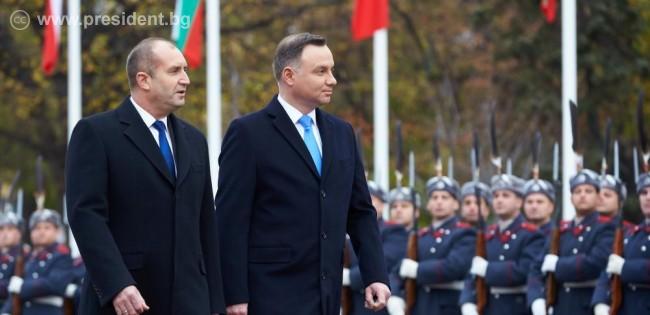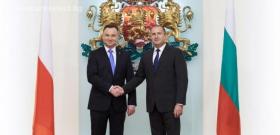 27 November 2018 | 15:55
27 November 2018 | 15:55
Rumen Radev and Andrzej Duda: Preserving the Potential of the Cohesion Policy and the Common Agriculture Policy is an Investment in the EU’s Unity
At a meeting in Sofia the Presidents of Bulgaria and Poland reiterated their support for the Western Balkans’ EU prospects
Preserving the potential of the cohesion policy and the common agriculture policy is an investment in the EU’s unity. Overcoming the economic and social discrepancies between the member states from Eastern and Western Europe is a guarantee for an even and stable development and this should find its place in the EU Multiannual Financial Framework. This was the common stance shared by the Presidents of Bulgaria and Poland Rumen Radev and Andrzej Duda, who held a meeting at 2 Dondukov street today. President Duda is on an official visit in Bulgaria at the invitation of the Bulgarian Head of State. The two presidents were unanimous that Bulgaria and Poland will continue the dialogue on adopting a common stance within the European agenda and in the debate on united Europe’s future.
Although Brexit is a challenge for the EU, Bulgaria and Poland respect the sovereign choice of the British people, it emerged at the meeting. A lot of Bulgarians, Poles and other EU citizens work, study and live in Great Britain and therefore it is equally important for both countries that the agreement between the EU and Great Britain should safeguard the rights of the European citizens in the United Kingdom and the British citizens that live in EU member states. “It is essential that we draw lessons and in my opinion, at the European elections, chance should be given to those parties that guarantee Europe’s sustainable future regarding security, economic development, overcoming the economic and social inequalities and going back to the EU’s moral principles and values – solidarity and unity,” Rumen Radev said. In the Bulgarian President’s words, without overcoming the economic inequalities, there will always be tension in Europe. A country’s giving up sovereignty upon accession to the EU does not mean giving up cultural and national identity, the Head of State added and called on the European institutions to reform their functions in such a way so that the EU citizens feel better presented in them.
Both Rumen Radev and Andrzej Duda highlighted the necessity to take common actions to achieve sustainable results in the EU migration policy, which should be based on a more efficient border control and support for the economic and social development of the countries the migrants come from. President Radev voiced our country’s position against sending the migrants back to the countries that protect the external EU borders.
The meeting of the two Heads of State also focused on the regional partnership within the Three Seas initiative, the goal of which is to strengthen the transport, energy and digital connectivity among the countries from the Baltic, Adriatic and Black Sea regions. The Bulgarian President emphasized our country’s interest in building the so-called vertical gas corridor, which will improve the security of the energy supplies and also in Bulgaria’s full-fledged participation in the Via Carpatia transport corridor.
The Western Balkans are an indispensable part of Europe and Bulgaria and Poland will continue to support the European prospects of the countries that strive to achieve a full-fledged EU membership. Investing in the connectivity, security and stability of the region is an important step towards promoting the European integration of our neighbors, Rumen Radev further said. The Head of State noted our country’s readiness to join the format for regional political dialogue Berlin Process, which we can support with our expertise and as an immediate neighbor of the countries from the region. Andrzej Duda highlighted Bulgaria’s contribution to incorporating the Western Balkans countries in projects on increasing the regional connectivity and their European integration and particularly to strengthening the stability in Southeastern Europe.
As for the forthcoming international forum on fighting climate changes that will be held at the beginning of December in the Polish town of Katowice, the Bulgarian President was adamant that urgent measures should be taken. However, they “should remain within what was agreed upon without extra increase of the requirements and the state and prospects for the development of our energy systems should be taken into account so that our countries will not allow a loss of competitiveness. The social rights of the workers should also be preserved.”
As NATO allies, Bulgaria and Poland share a common responsibility and work together to strengthen the security in Eastern Europe, it was emphasized at the meeting. The modernization of the Bulgarian Armed Forces and the opportunity for Poland to take part in this process, was also stressed at the talks. In Rumen Radev’s words, every NATO member state should contribute to strengthening the Alliance both by displaying political wisdom and by building the necessary defense capabilities.
The two presidents also discussed the increasing tension between Russia and Ukraine in the Black Sea region in the past days. In President Radev’s opinion, in this situation both countries should show “restraint and common sense and should ensure the quickest possible de-escalation through dialogue, without using force and should guarantee the freedom of civilian shipping and the Russian Federation should promptly return and set free the sailors.” The Bulgarian President was adamant that for us as neighboring countries in this region it is essential to prevent a further escalation of the tension.
Strengthening the bilateral trade relations between Bulgaria and Poland was identified by Rumen Radev and Andrzej Duda as a sign of trust in the bilateral relations, which serves the interests of the business, increasing employment and the competitiveness of our economies. The annual trade exceeds 1.7 billion euros and the Bulgarian Head of State highlighted the potential for increasing the mutual investments and the implementation of joint projects in the energy sector and other sectors of mutual interest. Our country is a traditional destination for Polish tourists. Almost 400,000 Poles visited Bulgaria in 2017 and over 65,000 Bulgarians chose to spend their holiday in Poland.
In the coat-of-arms hall in the presidential institution, in the presence of Presidents Rumen Radev and Andrzej Duda, an illustrated stamp was validated on the occasion of the 100th anniversary of the establishment of diplomatic relations between Bulgaria and the Republic of Poland.
 President Radev: Improving Connectivity Is Key to Strengthening Security and Stability in the Black Sea Region
President Radev: Improving Connectivity Is Key to Strengthening Security and Stability in the Black Sea Region
 Radev Discussed Europe's Prospects for Addressing the Challenges It Faces with Hungarian Foreign Minister
Radev Discussed Europe's Prospects for Addressing the Challenges It Faces with Hungarian Foreign Minister
 President Rumen Radev Imposes a Veto on the Amendments to the Act on the Administrative Regulation of Economic Activities Related to Oil and Petroleum Products
President Rumen Radev Imposes a Veto on the Amendments to the Act on the Administrative Regulation of Economic Activities Related to Oil and Petroleum Products
 President: Bulgaria and Lebanon Share a Common Aspiration to Activate the Dialogue between Institutions and Business Representatives
President: Bulgaria and Lebanon Share a Common Aspiration to Activate the Dialogue between Institutions and Business Representatives
 Rumen Radev: The Release of the Bulgarian Medics in Libya Was a Test Not Only for Bulgaria, but also for the Moral Strength of the International Community
Rumen Radev: The Release of the Bulgarian Medics in Libya Was a Test Not Only for Bulgaria, but also for the Moral Strength of the International Community
 President Rumen Radev Honoured the Ambassador of Japan with the Order of the Madara Horseman, First Class
President Rumen Radev Honoured the Ambassador of Japan with the Order of the Madara Horseman, First Class
 Rumen Radev: Bulgaria relies on honorary consuls in our country to contribute to the creation of new partnerships in the economy, innovations and education
Rumen Radev: Bulgaria relies on honorary consuls in our country to contribute to the creation of new partnerships in the economy, innovations and education
 Rumen Radev: Egypt Is a Partner of Strategic Importance for Bulgaria and the EU
Rumen Radev: Egypt Is a Partner of Strategic Importance for Bulgaria and the EU







 2025
2025